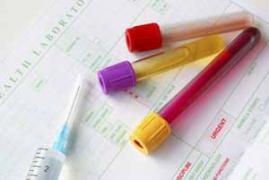What do Blood Tests Tell Your Veterinarian?

What do Blood Tests Tell Your Veterinarian?
Veterinarians at The Animal Medical Center must say “Let’s send some blood to the lab” about 100 times a day. But what are we looking for in all those tubes of blood with the colorful stoppers?
CBC = Complete Blood Count
Your dog’s or cat’s blood contains at least four types of white blood cells, red blood cells and blood clotting cells, called platelets. A complete blood count analyzes what cells are present, how many cells of each type make up the blood sample, and identifies any unusual cells present. For example, the presence of increased numbers of immature white blood cells, called band neutrophils or bands for short, indicate a serious infection. Last week, one of my patients had an elevated total white blood cell count and 1,236 bands per microliter of blood; normal is less than 300. An abdominal ultrasound determined she had a gallbladder infection. In addition to assessing the types and numbers of white blood cells, the CBC measures the number of red blood cells and several different features of them as well. A lack of red blood cells is called anemia, and too many red blood cells suggests a rare hematologic disorder called polycythemia. Size is a critical diagnostic feature of red blood cells – too big and we look for an increase in baby red blood cells responding to bleeding or anemia; too small and we worry about iron deficiency. The amount of hemoglobin (oxygen carrying protein) is measured as well. If there is too little hemoglobin, we worry about iron deficiency, and red blood cells are so smart they never synthesize too much hemoglobin. If the lab report indicates the hemoglobin is elevated, we scrutinize the sample for possible errors.
Chem Panel = Serum Biochemical Profile
The CBC looks at the whole blood sample in pretty much the same form as it circulates in the bloodstream. Serum is the liquid portion of the blood without the blood cells. Serum is produced in the lab by spinning the blood in a centrifuge and using a pipette to remove the liquid portion. The serum sample is used to run a serum biochemical profile, a series of 20 or so tests that come in a panel. The chem panel can be divided up into several different organ systems. Some tests increase with liver disease like the alanine amino transferase, or bilirubin. When a patient has a kidney problem, we often see elevations in blood urea nitrogen and creatinine. Then there is a group of tests that analyzes the concentration of chemical elements like calcium, phosphorus, sodium, potassium and chloride in the blood. These analytes are important for cellular function and can be abnormal in a wide variety of diseases, like adrenal gland diseases, kidney disease and urinary blockage. Typically a chem panel includes measurement of the protein level in the blood. Protein is affected by a wide variety of conditions and is usually interpreted in concert with the other abnormalities found in the panel. Finally, the chem panel measures blood sugar when looking for diabetes or low blood sugar.
The Combination is Critical
Submission of a CBC and chem panel is so routine that it is test #1 in The AMC’s lab ordering system! When paired, these two tests become a powerful tool for veterinarians to assess the health of your pet or to direct further testing to identify the cause of your pet’s illness.
Fun Things Blood Tests Can Tell Us
Blood tests don’t only tell us about disease, but also can give us other little tidbits about your pet:
- If you have a mixed breed dog, a blood test analyzing your dog’s DNA can tell you about his parents and what breeds are in his genetic makeup.
- Avian specialists use a blood test to tell if your bird is a boy or girl.
- A blood test can also be used to predict the birth of a litter of puppies. A rise in blood progesterone to 2-3 micrograms/ml occurs 63 to 65 days prior to whelping – the dog word for birth of puppies.

































